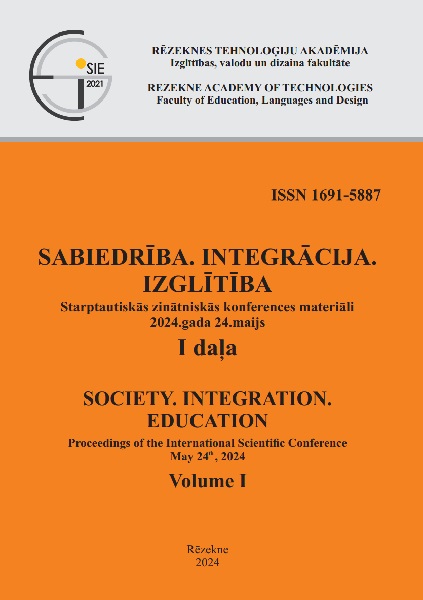CHALLENGES OF DIGITAL EDUCATION DEVELOPMENT AT LAW ENFORCEMENT TRAINING INSTITUTIONS
DOI:
https://doi.org/10.17770/sie2024vol1.7905Keywords:
artificial intelligence, digital competence, digital education, law enforcementAbstract
With the ongoing progress of digital education opportunities, recently the buzz of artificial intelligence law enforcement education processes also requires identification and analysis of evolving phenomena. In order to ensure a safe up-to-date, highly efficient training process law enforcement officials involved in education process need to be competent with current education trends as well as be able to establish future visionary self-developments, be able for timely adaptation and constant exchange of best practices. The main goal of the article is to identify, analyse and summarizes latest EU scale digital education development visions and research results in context of digital learning, artificial intelligence, possible problems, risks and concerns regarding further digital education integration within specific law enforcement education environment. The article includes the identification of problematic areas by using historic research method, particularly from digital education integration learning experiences. At the conclusion of this research future outlooks in harnessing the potential of digital education within law enforcement have been proposed based on analysis of scientific literature, legal documents as well as empirical insights derived from hands-on experience in teaching within law enforcement environment.
References
Achiam, J. (2023). Pioneering research on the path to AGI. Retrieved from: https://openai.com/research/overview
Božič, V., Poola, I. (2023). Chat GPT and education. Retrieved from: https://www.researchgate.net/publication/369926506_Chat_GPT_and_education
European Commission. (2020). Digital Education Action Plan (2021-2027). Resetting education and training for the digital age. Retrieved from: https://ec.europa.eu/education/education-in-the-eu/digital-education-action-plan_en
European Commission (2023). Commission calls for massive boost in enabling digital education and providing digital skills. Retrieved from https://ec.europa.eu/commission/presscorner/detail/en/IP_23_2246
European Commission (2020) Factsheet. Proposal for a Council Recommendation on improving the provision of digital skills in education and training. Retrieved from https://education.ec.europa.eu/document/factsheet-proposal-for-a-council-recommendation-on-improving-the-provision-of-digital-skills-in-education-and-training
Jimenez, L., Boser, U. (2021). Future of Testing in Education: Artificial Intelligence. Retrieved from: https://www.americanprogress.org/article/future-testing-education-artificial-intelligence/
Jurista vārds. (2023). Augstākās izglītības padomes paziņojums par mākslīgā intelekta rīku izmantošanu augstākajā izglītībā un pētniecībā. Retrieved from: https://juristavards.lv/zinas/283101-augstakas-izglitibas-padomes-pazinojums-par-maksliga-intelekta-riku-izmantosanu-augstakaja-izglitiba/
Laufer, M., Leiser, A., Deacon, B. (2020). Digital higher education: a divider or bridge builder? Leadership perspectives on edtech in a COVID-19 reality. Int J Educ Technol High Educ 18, 51 (2021). Retrieved from: https://doi.org/10.1186/s41239-021-00287-6
Montenegro-Rueda, M.; Fernández-Cerero, J.; Fernández-Batanero, J.M.; López-Meneses, E. (2023). Impact of the Implementation of ChatGPT in Education: A Systematic Review. Computers 2023, 12, 153. https:// doi.org/10.3390/computers12080153 Retrieved from https://www.mdpi.com/2073-431X/12/8/153
Nalbandian, L. (2022). An eye for an ‘I:’ a critical assessment of artificial intelligence tools in migration and asylum management. CMS 10, 32. Retrieved from: https://doi.org/10.1186/s40878-022-00305-0
Pocock, K. (2024). What is ChatGPT? Why you need to care about GPT-4. Retrieved from https://www.pcguide.com/apps/what-is-chat-gpt/
Redden, J., Aagaard, B., Taniguchi, T., (2020). Artificial Intelligence Applications in Law Enforcement: An Overview of Artificial Intelligence Applications and Considerations for State and Local Law Enforcement. Retrieved from https://www.ojp.gov/ncjrs/virtual-library/abstracts/artificial-intelligence-applications-law-enforcement-overview
Soomro, K.A., Kale, U., Curtis, R. (2020). Digital divide among higher education faculty. Int J Educ Technol High Educ 17, 21 (2020). https://doi.org/10.1186/s41239-020-00191-5
UNESCO (2019). Beijing Consensus on Artificial Intelligence and Education. Retrieved from https://unesdoc.unesco.org/ark:/48223/pf0000368303






